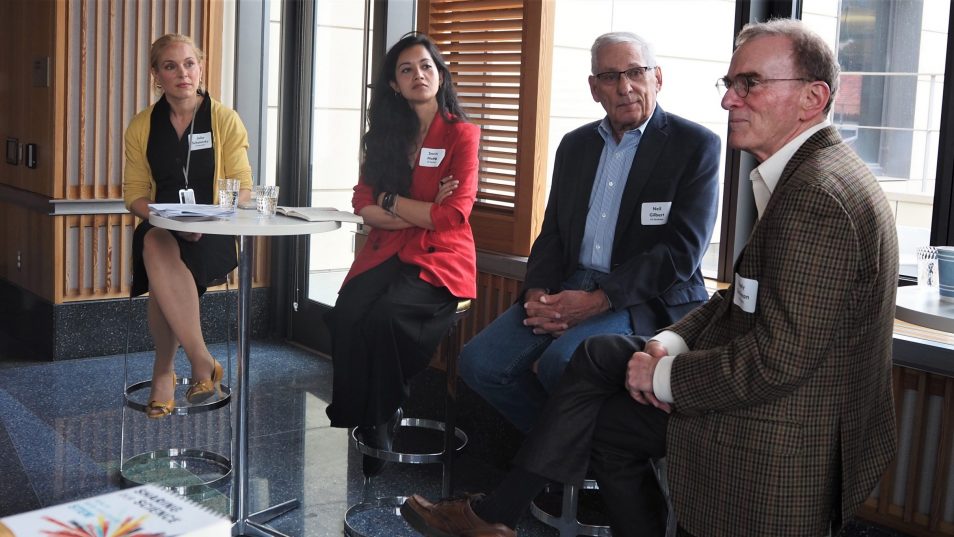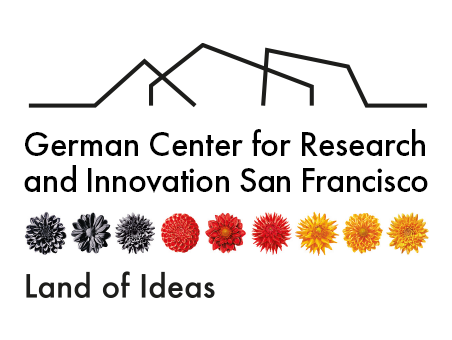Science Communication – Changes in the Relationship between Science and Society

Open access, integrity in research, and best practices for communication were among the array of topics explored at the Symposium on Science Communication, which took place on Friday, September 15th at the University of California, Berkeley. Moderated by Julia Schaletzky, Executive Director of the Harry Wheeler Center for Emerging & Neglected Diseases (CEND) at UC Berkeley, the symposium began with a keynote by Nobel laureate Randy Schekman (Medicine, 2013). Consul General Oliver Schramm also greeted attendees, highlighting the importance of science communication for the development of our society.
Following the keynote, the event addressed difficulties that scientists face in disseminating their findings, the need to foster diverse perspectives in research, and how the scientific community can better restore trust in its work. In times when fear and disinformation distort their message, scientists must proactively communicate how their research contributes to human understanding and shapes responsible policy.
In his remarks, Schekman noted that billions of taxpayer dollars fund public research, yet the public and even scientific collaborators are unable to access those research studies. The cause of this, Schekman argued, is the racket of large publishing enterprises, which charge exorbitant licensing fees and restrict the number of papers published to maintain their exclusivity.
 Many postdoctoral scholars and junior scientists spend years, money, and endless hours of effort in the hope that they can publish in one of these journals. This pressure to publish has led some to cherry-pick or falsify their data results, threatening the integrity of scientific research. These issues are systemic: notably, journals such as Nature and Science have recently issued several spectacular retractions. In a later panel, Schekman, joined by colleagues Neil Gilbert, Professor at the School of Social Welfare, and Smriti Mehta, a researcher at the Department of Psychology, discussed some implications of open access expansion, such as ensuring rigorous peer-review processes and quality vetting of journals. They discussed how metrics traditionally used to evaluate scientists, such as impact factors, carry significant flaws, and how recent metrics, such as social media followers, can sometimes impact a researcher’s career. Moreover, publication of research in an academic ecosystem is a privilege and differs from research in the private sector, which often remains in the company until a product can be launched.
Many postdoctoral scholars and junior scientists spend years, money, and endless hours of effort in the hope that they can publish in one of these journals. This pressure to publish has led some to cherry-pick or falsify their data results, threatening the integrity of scientific research. These issues are systemic: notably, journals such as Nature and Science have recently issued several spectacular retractions. In a later panel, Schekman, joined by colleagues Neil Gilbert, Professor at the School of Social Welfare, and Smriti Mehta, a researcher at the Department of Psychology, discussed some implications of open access expansion, such as ensuring rigorous peer-review processes and quality vetting of journals. They discussed how metrics traditionally used to evaluate scientists, such as impact factors, carry significant flaws, and how recent metrics, such as social media followers, can sometimes impact a researcher’s career. Moreover, publication of research in an academic ecosystem is a privilege and differs from research in the private sector, which often remains in the company until a product can be launched.
The third panel, which included Martin Storksdieck, Professor at Oregon State University, Brandon Brown, Professor at the University of San Francisco, and Sabeeha Merchant, Professor at UC Berkeley, addressed the role of communicating science to the broader public. They emphasized the responsibility that scientists have to educate the public about their work. In particular, science should not be detached from society and scientists should build their teaching skills early in their career. Merchant emphasized the importance of having professional communicators who understand the audience. She noted that some technical experts, untrained in communication, may use phrasing that confuses their audience or in the worst case, undermine their mission. The panelists also addressed the importance of fostering a healthy culture in research labs. In intensive research environments, individual achievement often trumps the ideals of teamwork and contributions to the field, causing conflicts.

The final panel, which included Elena Conis, Professor at UC Berkeley School of Journalism, emphasized the importance of educating the public on science through journalism. She stated that journalists should approach scientists with curiosity and that scientists should not hesitate to answer questions from journalists, even from less-prestigious newspapers. Many smaller newspapers have different audience demographics, and by establishing relationships with journalists, scientists can make a much broader contribution to the public good. Indeed, scientific research is a methodological process that often results in revised conclusions; this often conflicts with the public demand for immediate answers, tribalism, and the comfortability of preconceived beliefs.
Moreover, panelists addressed the pernicious issue of censorship of genuine scientific debate by so-called “fact checkers,” who are given undue power to interpret what is correct. Schaletzky explained that these “fact-checkers” are often not qualified to make the decisions and unable to distinguish among normal scientific debate, misinformation, which is an honest mistake, and disinformation, which is false and malicious. The term “mal-information”, which includes true statements that challenge policies or prevailing thought, was called out as particularly difficult to reconcile with the process of moving towards truth in science, which includes robust debate and continuous challenges of a scientist’s work. On the contrary, a “streamlined” message, desirable by politicians, is fundamentally at odds with the scientific process. Care must be taken to ensure that legitimate scientific skepticism and criticism is not silenced in the name of “staying on message.” If not, “streamlined” messaging can stifle genuine scientific debate, threatening the integrity of the scientific establishment and trust in science.
 The event closed with final remarks by René Haak, Minister Counselor and Head of the Science and Technology Section at the German Embassy in Washington DC. He pointed out that science communication plays a decisive role in our modern society by bridging the gap between complex scientific findings and the broad public — civil society. Because scientific findings are often complex and require simplification without sacrificing accuracy, finding the right balance presents a big challenge for scientists and journalists. He emphasized that this balance is a learning process that needs to be cultivated. In an era when news spreads rapidly, scientific findings must compete with other news items for attention. Sensational reporting can threaten the integrity of scientific information. In other words, he said, the integrity of science must be preserved as part of targeted science communication. He made it clear that misinformation about scientific subjects spreads easily, which leads to confusion and skepticism. Criticism of established scientific findings can undermine trust in science. Thus, it is important to continue dedicating ourselves to the issue of trust in science.
The event closed with final remarks by René Haak, Minister Counselor and Head of the Science and Technology Section at the German Embassy in Washington DC. He pointed out that science communication plays a decisive role in our modern society by bridging the gap between complex scientific findings and the broad public — civil society. Because scientific findings are often complex and require simplification without sacrificing accuracy, finding the right balance presents a big challenge for scientists and journalists. He emphasized that this balance is a learning process that needs to be cultivated. In an era when news spreads rapidly, scientific findings must compete with other news items for attention. Sensational reporting can threaten the integrity of scientific information. In other words, he said, the integrity of science must be preserved as part of targeted science communication. He made it clear that misinformation about scientific subjects spreads easily, which leads to confusion and skepticism. Criticism of established scientific findings can undermine trust in science. Thus, it is important to continue dedicating ourselves to the issue of trust in science.
The event mixed audience questions with the panel discussions and concluded with a luncheon at the Li Ka Shing Center, where participants stayed long after to engage one-on-one with the speakers. The preceding evening reception at the German Consul General’s Residence and the day-long symposium were sponsored and organized by the Harry Wheeler Center for Emerging and Neglected Diseases at UC Berkeley, German Center for Research and Innovation (DWIH) San Francisco, German Research Foundation (DFG), German Historical Institute (GHI), Embassy of Germany in Washington D.C., and the Consulate General of Germany in San Francisco. Following the symposium, attendees were invited to the opening of the Exhibit “Fascination Science” by German Artist Herlinde Koelbl (at the lobby of Li Ka Shing), which showcased 40 portraits of renowned scientists.
Photos from the event can be found here.
